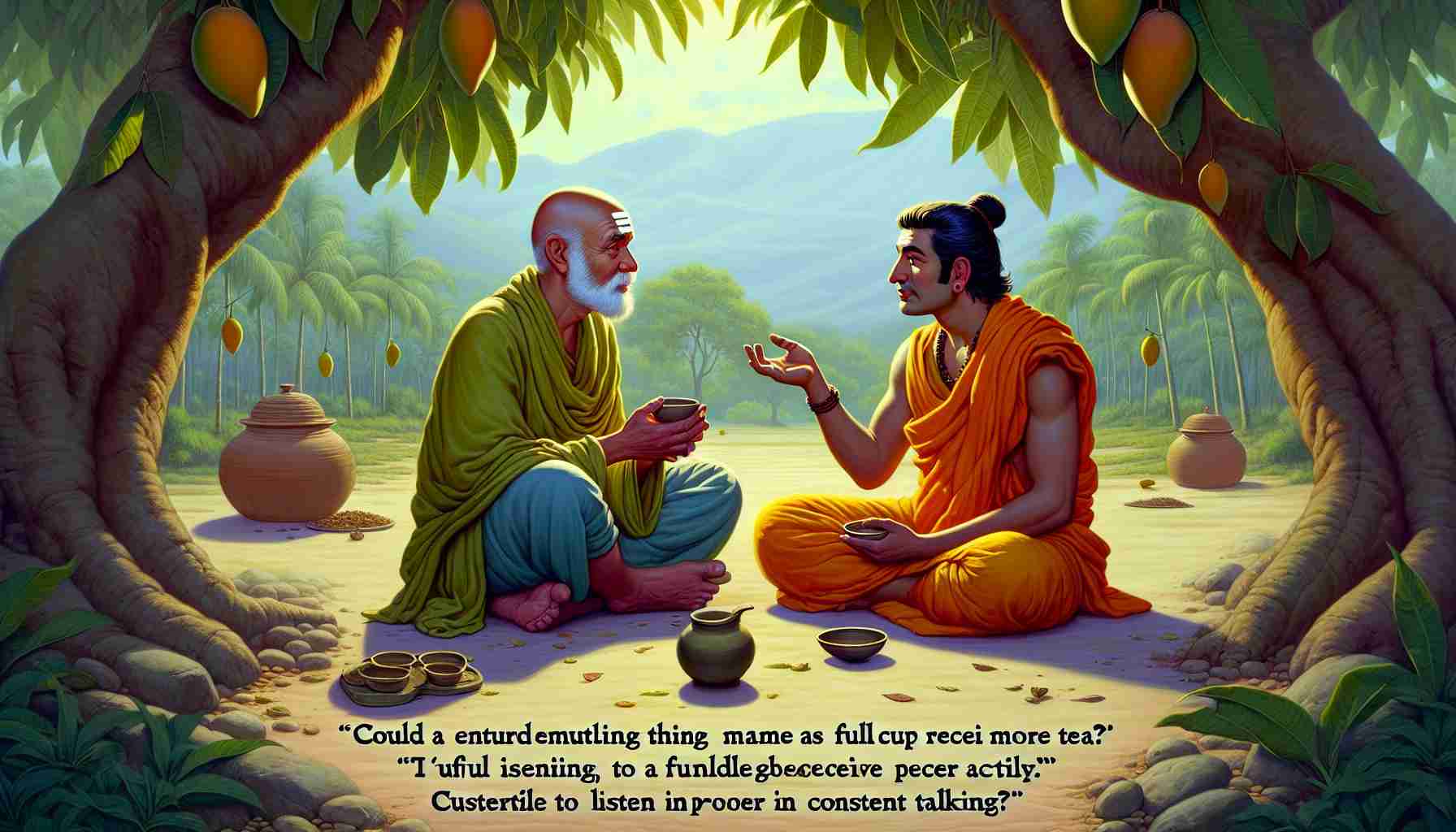

You won’t find my name in any scroll, but I was there, seated at the edge of the mango grove, just outside the town of Savatthi. I was a student of the Buddha—one of many who traveled from far and wide to hear the words of the Awakened One. That day, something happened that taught me more than a thousand teachings could.
The heat shimmered across the path when an elegantly dressed man approached where the Buddha was seated, surrounded by monks. His robes gleamed white, his hair neatly tied, and his speech began even before he bowed. He was a Brahmin—a member of the highest caste in our region, often scholars and priests. Commanding in presence, his voice echoed as he spoke.
"I am learned in the Vedas, O Gautama," he began with a wide smile, "versed in recitation and sacrifice. I know the laws and the duties of a good man. Listen, and I shall teach you."
The Buddha did not interrupt. He listened calmly, just as he always did—with a presence so still it made you aware of your own heartbeat. The Brahmin continued talking—about rituals, gods, dharma as he knew it. Somewhere between pride and passion, his words spilled like the Ganges during the monsoon.
I glanced at the faces around me. Some monks looked confused. Others frowned. But the Buddha remained the same—quiet, watchful, compassionate.
At last, when the Brahmin paused to breathe, the Buddha raised a gentle hand.
“Brahmin,” the Buddha said softly, “can a cup already full receive more tea?”
The Brahmin blinked, uncertain. “No,” he answered. “It would overflow.”
“And if a man speaks without listening, can he receive wisdom?”
The Brahmin’s lips tightened. He looked around, finally noticing the quiet stares of the monks, and perhaps hearing the weight of his own words.
The Buddha continued, “Wise men do not speak to showcase their knowledge. They speak after listening, with compassion, and only when their words are of benefit. Speech without mindfulness is like a drum beaten in the wind—loud, but empty.”
The grove fell silent.
Then, something unexpected happened—the Brahmin bowed. Deeply. Slower than when he entered, his voice barely carried. “I came to speak, but I leave to listen,” he whispered.
And he sat among us, at the edge of the circle, hardly noticeable now, like a white flower folded under the shade of a tree.
That lesson stayed with me longer than any teaching. Many believe strength is in speaking, but the Buddha showed us that mindfulness requires silence, and wisdom begins with listening. The Brahmin—once so proud—was transformed not through punishment, but through gentle truth.
I walked away from the grove that day with a strange lightness in my chest. I had always feared being silent, thinking it showed ignorance. But little did I know, in silence, we make space for truth. The Brahmin who once spoke too much became the man who listened deeply—and so became wise.
You won’t find my name in any scroll, but I was there, seated at the edge of the mango grove, just outside the town of Savatthi. I was a student of the Buddha—one of many who traveled from far and wide to hear the words of the Awakened One. That day, something happened that taught me more than a thousand teachings could.
The heat shimmered across the path when an elegantly dressed man approached where the Buddha was seated, surrounded by monks. His robes gleamed white, his hair neatly tied, and his speech began even before he bowed. He was a Brahmin—a member of the highest caste in our region, often scholars and priests. Commanding in presence, his voice echoed as he spoke.
"I am learned in the Vedas, O Gautama," he began with a wide smile, "versed in recitation and sacrifice. I know the laws and the duties of a good man. Listen, and I shall teach you."
The Buddha did not interrupt. He listened calmly, just as he always did—with a presence so still it made you aware of your own heartbeat. The Brahmin continued talking—about rituals, gods, dharma as he knew it. Somewhere between pride and passion, his words spilled like the Ganges during the monsoon.
I glanced at the faces around me. Some monks looked confused. Others frowned. But the Buddha remained the same—quiet, watchful, compassionate.
At last, when the Brahmin paused to breathe, the Buddha raised a gentle hand.
“Brahmin,” the Buddha said softly, “can a cup already full receive more tea?”
The Brahmin blinked, uncertain. “No,” he answered. “It would overflow.”
“And if a man speaks without listening, can he receive wisdom?”
The Brahmin’s lips tightened. He looked around, finally noticing the quiet stares of the monks, and perhaps hearing the weight of his own words.
The Buddha continued, “Wise men do not speak to showcase their knowledge. They speak after listening, with compassion, and only when their words are of benefit. Speech without mindfulness is like a drum beaten in the wind—loud, but empty.”
The grove fell silent.
Then, something unexpected happened—the Brahmin bowed. Deeply. Slower than when he entered, his voice barely carried. “I came to speak, but I leave to listen,” he whispered.
And he sat among us, at the edge of the circle, hardly noticeable now, like a white flower folded under the shade of a tree.
That lesson stayed with me longer than any teaching. Many believe strength is in speaking, but the Buddha showed us that mindfulness requires silence, and wisdom begins with listening. The Brahmin—once so proud—was transformed not through punishment, but through gentle truth.
I walked away from the grove that day with a strange lightness in my chest. I had always feared being silent, thinking it showed ignorance. But little did I know, in silence, we make space for truth. The Brahmin who once spoke too much became the man who listened deeply—and so became wise.